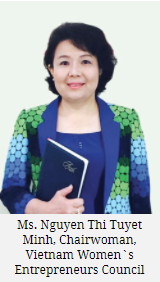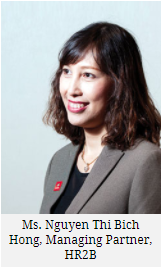
I think the role of women in business is the same as for men, but we must make sure that the business environment for women is indeed similar. This would give them a platform to show their ability and express their confidence. I think the environment in Vietnam is now more open for women and there are many enterprises and foundations that women lead, so overall they should improve skills such as soft skills and technical skills. Twenty-five per cent of CEOs in Vietnam are women and they have expressed themselves at events like Womenwill on January 17 in Hanoi. I think the government should have training programs to assist women in knowledge and improve their skills. Though Vietnamese women have to cope with a certain degree of prejudice, I believe that Industry 4.0 will curb this. It can be a powerful tool for them to manage and operate their enterprises and connect with and learn from foreign enterprises.
 I think Vietnamese women and women in general have so much to offer and they have great potential. They have shown their ability in business and there are many women that have been honored. It is clear that they have achieved success in business. In my view, they possess many good characteristics, including diligence and an ability to persist no matter the challenge. They can balance work and family and do both roles well. Sometimes, however, they do not look after themselves. So, learning and improving are necessary in modern society, because this will help them have a prestigious position. I think the potential of Vietnamese women is unlimited and I admire them. I came to Vietnam from Australia seven years ago and I have seen how they work and how they look to the future and don’t think about the past. I want to say to Vietnamese women that they should believe in themselves and try to do what they want to do. They can do so many valuable things in modern life, with proper support from the government, domestic and international organizations, and Vietnamese women’s associations. With the current boom in technology, the distance between men and women will be bridged, and women can support each other well.
I think Vietnamese women and women in general have so much to offer and they have great potential. They have shown their ability in business and there are many women that have been honored. It is clear that they have achieved success in business. In my view, they possess many good characteristics, including diligence and an ability to persist no matter the challenge. They can balance work and family and do both roles well. Sometimes, however, they do not look after themselves. So, learning and improving are necessary in modern society, because this will help them have a prestigious position. I think the potential of Vietnamese women is unlimited and I admire them. I came to Vietnam from Australia seven years ago and I have seen how they work and how they look to the future and don’t think about the past. I want to say to Vietnamese women that they should believe in themselves and try to do what they want to do. They can do so many valuable things in modern life, with proper support from the government, domestic and international organizations, and Vietnamese women’s associations. With the current boom in technology, the distance between men and women will be bridged, and women can support each other well.
Female Vietnamese CEOs are highly appreciated in the ASEAN region. CEOs in the country have begun to use more professional methods and technologies to manage their businesses but still face many barriers. Many women still inherit the traditional craft of their family as a livelihood. They work by experience and instinct. This has led to certain challenges as Vietnam integrates, especially in the context of Industry 4.0, which requires high standards in technological application and management skills.
Industry 4.0 is coming and women need to actively explore and seize opportunities and address the challenges, using it in developing business development strategies. It will also help them accompany other professional CEOs in growing together in the digital age. Businesswomen must overcome their fears and actively capture information and technology. I think the important thing is whether we dare to move forward or not.

I don’t see any limitations on gender equality in Vietnam’s business environment, with a substantial number of women making progress in their careers. Most Vietnamese families now require that both husband and wife are out in the workforce.
I don’t see any distinction between men and women at State-owned enterprises or private enterprises, especially foreign enterprises. Many businesses provide a great deal of support for women in their career development.
Women have the chance to catch up with and stay abreast of men during Industry 4.0. The main drawback relates to family. This is nothing new but presents a challenge, especially during maternity leave. Many argue that men and women are different in terms of management. Women’s management is more emotional than men, while men have a different way of dealing with situations than women.
 Mekong Capital has invested in a number of Vietnamese companies owned and managed by female CEOs and I recognize that their strategies are no different from other companies. I think that female leaders actually hold certain advantages, such as flexibility, patience, and sensitivity in terms of communications or crisis resolution. Recently, when I joined HAWEE, I realized that female leaders are also good at balancing work and life. For example, one day they are actively involved in research, learning, and updating trends and best practices in operating their business, such as Industry 4.0 and artificial intelligence (AI), and the next day balance their life. Successfully applying developments from Industry 4.0 is one of the greatest difficulties that all CEOs must face. It’s down to one’s openness and receptiveness towards changing management and being ready to address events and transform. The choice is either being in the game or out of the game. I believe there is a shortage of skilled specialists able to deploy Industry 4.0.
Mekong Capital has invested in a number of Vietnamese companies owned and managed by female CEOs and I recognize that their strategies are no different from other companies. I think that female leaders actually hold certain advantages, such as flexibility, patience, and sensitivity in terms of communications or crisis resolution. Recently, when I joined HAWEE, I realized that female leaders are also good at balancing work and life. For example, one day they are actively involved in research, learning, and updating trends and best practices in operating their business, such as Industry 4.0 and artificial intelligence (AI), and the next day balance their life. Successfully applying developments from Industry 4.0 is one of the greatest difficulties that all CEOs must face. It’s down to one’s openness and receptiveness towards changing management and being ready to address events and transform. The choice is either being in the game or out of the game. I believe there is a shortage of skilled specialists able to deploy Industry 4.0.  There are many women-led businesses in Vietnam. Figures show that 25 per cent of CEOs in the country are women. In general, however, women work primarily in small and medium-sized enterprises (SMEs), not in large enterprises.
There are many women-led businesses in Vietnam. Figures show that 25 per cent of CEOs in the country are women. In general, however, women work primarily in small and medium-sized enterprises (SMEs), not in large enterprises.
Technology does not discriminate and the opportunities will come to those who have the best access or adapt the quickest. Sometimes women don’t do this, however, or lack consistency and determination, so they miss more opportunities compared to men.
I think Industry 4.0 is creating tremendous opportunities for everyone as well as posing challenges for every individual and organization in society, especially in developing countries like Vietnam. Vietnam should not be too eager to make decisions that are not based on reality. Vietnamese women also need to be careful. There are many opportunities, but they only come to those who have a certain level of knowledge and an ability to continually learn. They can therefore learn new things about technology and the way to apply it in different fields.
Workplace skills and communications skills are also important, because we are not only working and communicating with the community but also with machines. This is both a great opportunity and a challenge for women. Women are able to communicate well but sending a message and convincing others are not easy. Industry 4.0 requires female leaders be able to adapt to a constantly changing environment. This is also not easy for women. Meanwhile, a common characteristic of Vietnamese women is humility, not competitiveness, so many lack the determination to make decisions.

A recent report from Boston Consulting Group showing that some 25 per cent of CEOs or directors in Vietnam are women, which is higher than in some other countries in Southeast Asia, was a great boost to Vietnamese women and signifies success in gender diversity in the boardroom compared to their regional counterparts. This sets a role model for other women in Vietnam to follow; for them to lead or own SMEs and large enterprises.
Gender diversity has been proven to improve team performance and success.
In order to encourage gender diversity and increase overall levels of satisfaction among employees, companies could promote gender diversity from the top by taking the lead in ensuring the views of all employees are well-represented, or encourage women to showcase leadership by giving them high-visibility initiatives.
The most popular women CEOs often have very good performances and track records, like those at Vinamilk, TH Milk, and Unilever. They also possess nurturing and caring behavior, which are fundamental to the Y generation, setting a culture of peace and harmony in the organization. With the development of Industry 4.0, the challenge will be how to hold on to these human values in a digital revolution and cooperating with the next generation of industry, government, and academia to create a shared vision of the future. This is a challenge for all the leaders in the organization, regardless of gender.

Female CEOs possess certain advantages when managing a business. Firstly, they are often flexible in decision-making and in their communications with partners, so are more likely to receive support to quickly resolve any problems. They also work with employees in difficult times to identify solutions for the business. With these they inspire and motivate employees.
They also, however, face a host of challenges. First and foremost, women are usually perfectionists and are afraid of risk, so when faced with business decisions involving some level of risk can sometimes hesitate and miss opportunities. Female CEOs are also sometimes affected by emotions and so their control as not good as male CEOs. Moreover, female CEOs in Vietnam face obstacles in balancing work and family. Finally, some degree of social prejudice still exists in Vietnam and can influence the work of female CEOs. Many people still believe that women are too soft to run a business, and some business partners are reluctant to engage in major contracts with a female partner.
 Uniting Talent
with
Opportunity
Uniting Talent
with
Opportunity




Top page